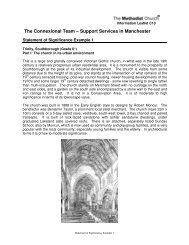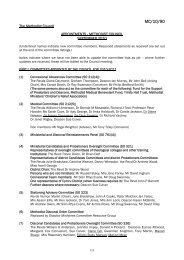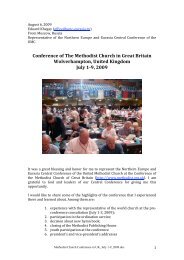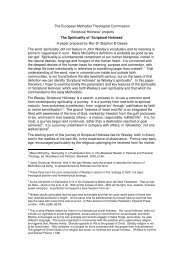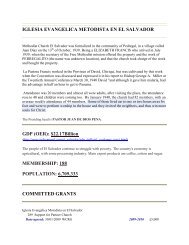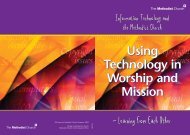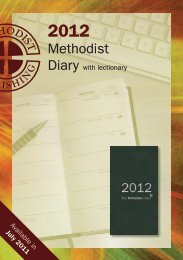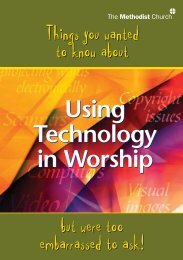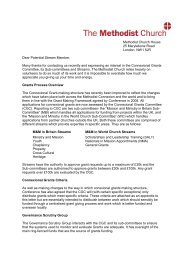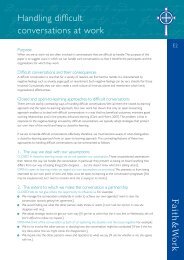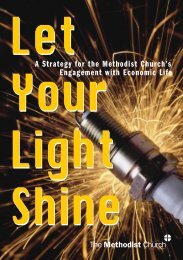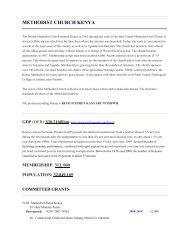Discipleship and the people called Methodists - BEH District
Discipleship and the people called Methodists - BEH District
Discipleship and the people called Methodists - BEH District
You also want an ePaper? Increase the reach of your titles
YUMPU automatically turns print PDFs into web optimized ePapers that Google loves.
has previously existed. And again perception is crucial. Subsidiarity understood<br />
as having something ‘dumped on us’ by ‘<strong>the</strong>m’, resulting in resentment, will<br />
kill us. Subsidiarity understood as encouraging us all to take decisions which<br />
make a difference <strong>and</strong> embody our continuing commitment to be a disciple-<br />
making movement will enliven us. When each part of <strong>the</strong> connexion recognises<br />
that’s what it is, is truly itself, interdependent <strong>and</strong> interrelated with <strong>the</strong> rest of<br />
<strong>the</strong> connexion, when it shares its stories, self underst<strong>and</strong>ings, challenges <strong>and</strong> a<br />
renewed commitment to contemporary disciple making, connexionalism will be<br />
streng<strong>the</strong>ned <strong>and</strong> renewed. If each part doesn’t underst<strong>and</strong> itself in <strong>the</strong>se terms,<br />
connexionalism throughout <strong>the</strong> whole Church is in grave danger.<br />
Missional<br />
Like all o<strong>the</strong>r Methodist structures connexionalism is essentially missional<br />
in intention <strong>and</strong> a chosen model for enabling disciple-making in <strong>the</strong> Methodist<br />
tradition. We look at a couple of examples of this.<br />
Itinerant ministry<br />
One of <strong>the</strong> elements of connexionalism going right back to <strong>the</strong> origins of Methodism<br />
is <strong>the</strong> nature of <strong>the</strong> Methodist ministry <strong>and</strong> particularly that it is an itinerant<br />
ministry. Methodism had travelling preachers before it ever had settled pastors.<br />
Methodist ministers – both presbyters <strong>and</strong> deacons – are ordained to <strong>the</strong><br />
whole Church. They’re appointed to circuits ra<strong>the</strong>r than specific congregation(s)<br />
<strong>and</strong> are ‘stationed’ – to use <strong>the</strong> technical term – to <strong>the</strong>se by <strong>the</strong> Conference.<br />
For <strong>the</strong>ir part Methodist circuits, through <strong>the</strong>ir leadership structures decide how<br />
presbyters, deacons, local preachers <strong>and</strong> increasingly lay employees with various<br />
roles exercise <strong>the</strong>ir ministry within <strong>the</strong> circuit. Circuits also share in <strong>the</strong> process<br />
whereby <strong>the</strong> whole Church attempts to identify a mutually apt ‘match’ of both<br />
minister <strong>and</strong> appointment in terms of fur<strong>the</strong>r enabling <strong>the</strong> mission of God through<br />
<strong>the</strong> ministry of <strong>the</strong> Church. Every part of <strong>the</strong> process involves both laity <strong>and</strong> clergy<br />
<strong>and</strong> is connexional in nature <strong>and</strong> intent. Itinerant ministry, ministry ‘sent’ <strong>and</strong><br />
‘received’ by <strong>the</strong> whole Church, demonstrates <strong>the</strong> missional commitment of a<br />
connexional Church. In Methodism ministers are intended to be a resource to<br />
be deployed essentially for purposes of mission ra<strong>the</strong>r than a workforce to be<br />
employed by local Methodist churches.<br />
9



